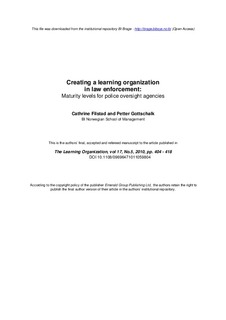| dc.contributor.author | Filstad, Cathrine | |
| dc.contributor.author | Gottschalk, Petter | |
| dc.date.accessioned | 2012-06-06T10:53:25Z | |
| dc.date.available | 2012-06-06T10:53:25Z | |
| dc.date.issued | 2010 | |
| dc.identifier.issn | 0969-6474 | |
| dc.identifier.uri | http://hdl.handle.net/11250/93410 | |
| dc.description | This is the authors' final and acceptet version, post refereeing, of the article. Publisher's version is available at www.emeraldinsight.com | no_NO |
| dc.description.abstract | Purpose – The purpose of this paper is to conceptualize a stage model for maturity levels for police
oversight agencies.
Design/methodology/approach – The paper is based on a literature review covering police
oversight organizations and stages of growth models.
Findings – As a conceptual paper, the main findings are related to the appropriateness of the stage
model, each identified stage, and the characteristics of each stage.
Research limitations/implications – An empirical study of police oversight agencies all over the
world would be necessary to verify the proposed stage model.
Practical implications – The managers of police oversight agencies can apply the model in three
ways: identify the current status; identify future direction; and evaluate the past progression.
Originality/value – Hitherto, knowledge transfer from police misconduct cases | no_NO |
| dc.language.iso | eng | no_NO |
| dc.publisher | Emerald Group Publishing Ltd | no_NO |
| dc.subject | Police misconduct | no_NO |
| dc.subject | Knowledge management | no_NO |
| dc.subject | Learning organizations | no_NO |
| dc.subject | Norway | no_NO |
| dc.title | Creating a learning organization in law enforcement: Maturity levels for police oversight agencies | no_NO |
| dc.type | Journal article | no_NO |
| dc.type | Peer reviewed | no_NO |
| dc.source.pagenumber | 404-418 | no_NO |
| dc.source.volume | 17 | no_NO |
| dc.source.journal | The Learning Organization | no_NO |
| dc.source.issue | 5 | no_NO |
| dc.identifier.doi | http://dx.doi.org/10.1108/09696471011059804 | |
